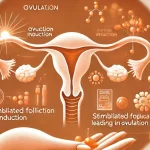Intracytoplasmic Sperm Injection, or ICSI. Maybe you've heard of it before, maybe not. Either way, we understand that fertility treatments can often be a complicated and emotional process. That is why we would like to explain everything you need to know about ICSI in a clear and accessible way. Whether you are considering undergoing this treatment yourself, or simply want to know more to support someone else - we are here to inform and guide you. Brace yourself as we dive into the details of how ICSI works, who it's suitable for and what you can expect during this journey. Let's start this journey together!
Who is ICSI for?
ICSI is a specific fertility technique that is often recommended for couples who have difficulty with natural fertilization. Especially men with fertility problems such as low sperm count, poor sperm mobility, or abnormally shaped sperm cells can benefit from this technique. In addition, ICSI is often the preferred method when previous IVF attempts have been unsuccessful or when there are obstructions in the man's reproductive organs that cannot be resolved with surgery.
Before deciding whether this treatment is right for you, it is important to be aware of several factors that may influence it. ICSI is also suitable for:
-
- Couples who are carriers of genetic disorders
-
- Women who suffer from unexplained infertility
-
- Iterations from previous failures of IVF treatments
Below is a table that briefly summarizes some key indicators and benefits of ICSI.
| Indicator | Benefit |
|---|---|
| Low sperm count | Increased chances of conception |
| Previous IVF failures | Alternative fertilization method |
| Genetic disorders | Selection of healthy sperm cells |
How does an ICSI treatment proceed?
| Step | Timeline |
|---|---|
| Hormonal Stimulation | 10-14 days |
| Egg puncture | 1 day |
| ICSI Fertilization | 1 day |
| Embryo transfer | 3-5 days after fertilization |
| Pregnancy test | 2 weeks after embryo transfer |
Hormonal stimulation
- Hormonal fluctuations
- Abdominal pain and bloating
- Mood swings
At Midwives Lelystad we ensure that you remain well informed and that you receive the right guidance. We closely monitor your progress through blood tests and ultrasounds. This way we can accurately adjust the dose of hormones so that your body responds optimally. Plus, we always deliver personalized care to ensure you feel comfortable and supported throughout your treatment.
Sperm release from the man
- Single-handed ejaculation
- Surgical extraction (e.g. TESE or MESA)
- Use of donor sperm
For a clear overview of the most important points:
| Release Method | When to use |
|---|---|
| Single-handed ejaculation | As usual, if quality is good |
| Surgical extraction | In case of obstructions or azoospermia |
| Donor seed | If your own seed is of poor quality |
Fertilization of the eggs in the laboratory
ICSI is a fascinating process that requires delicate actions. In the laboratory, eggs are carefully selected and prepared. Once a healthy egg is ready, a single sperm cell is injected directly into the egg with a tiny needle. It is impressive how the embryologists carry out this precision technique; it requires a steady hand and a sharp eye.
After the injection, the fertilized eggs are stored in a controlled environment. Here they are closely monitored to see whether they are developing properly into embryos. We provide special care to the embryos and follow their growth step by step. In this process we sometimes add nutrients to stimulate optimal development. If an embryo is well developed, we plan to transfer it back into the uterus. This often happens between the 2nd and 5th day after the injection.
| Step | Duration | Goal |
|---|---|---|
| Selection of oocytes | 1 hour | Guaranteeing the best quality |
| Injection of sperm | 30 minutes | Initiating fertilization |
| Culture of embryos | 2-5 days | Stimulate optimal development |
| Transfer | After embryo develops | Promote successful pregnancy |
Embryo transfer in the womb
-
- Comfort: During the process we ensure that you are sitting or lying comfortably.
-
- Correct timing: The embryo transfer takes place at the right time in the menstrual cycle.
-
- Peace: After the transfer it is important to take some rest, this helps with a successful implantation.
The whole process usually doesn't take long, but it has a big impact. Here are some features of the procedure:
| Feature | Details |
|---|---|
| Time: | 15-30 minutes |
| Procedure: | Minimally invasive |
| Result: | Increased chance of pregnancy |
What research is needed for an ICSI treatment?
Various examinations are necessary for successful ICSI treatment. First, it will be a thorough one analysis of the sperm executed. This involves an evaluation of sperm quality, looking at the quantity, motility and the morphological aspect of the sperm cells. Together with this analysis, a hormone research recommended for men. This helps to detect underlying hormonal disorders that may affect fertility.
Moreover, the woman undergoes various medical researches to check the ovaries, uterus and fallopian tubes. These may include ultrasound examinations and blood tests, for example for checking hormone levels. It may also be necessary to have one hysteroscopy to carefully examine the uterine cavity. This combined approach ensures that the treatment plan is tailor-made as much as possible, fitting the specific needs of the couple.
| Research | Goal |
|---|---|
| Semen analysis | Assess seed quality |
| Hormone research (male) | Detecting hormonal disorders |
| Ultrasound examination | Check ovaries and uterus |
| Blood tests (female) | Check hormone levels |
| Hysteroscopy | Examine uterine cavity |
The chance of pregnancy after ICSI treatment
-
- Under 35 years: About 30-35% success.
-
- 35-37 years: About 25-30% success.
-
- 38-40 years: About 20-25% success.
-
- 41 years and older: Around 10-15% success.
However, improved techniques and medical advances make it possible to increase these chances. Yet it remains essential to have realistic expectations and to take into account the emotional and financial aspects of an ICSI treatment. Midwives Lelystad are always ready to support you and answer all questions.
What risks are there with an ICSI?
-
- Ovarian hyperstimulation syndrome (OHSS): This can occur in response to hormone treatments, sometimes leading to abdominal pain and swelling.
-
- Infections: Because the ovaries are manipulated more during ICSI, the risk of infections increases slightly. This often requires antibiotics.
-
- Emotional burden: The road to pregnancy through ICSI can be intense and emotionally difficult. Good guidance and support are essential.
| Risk | Frequency |
| Multiple pregnancy | 20-30% |
| OHSS | 5-10% |
| Infections | 1-2% |
| Emotional burden | Always |
ICSI: possible side effects and complications for the woman
An Intracytoplasmic Sperm Injection (ICSI) can make a world of difference for couples who have difficulty conceiving. However,as withany medical procedure, there are possible side effects and complications what to think about. Although most women do not experience serious problems, it is essential to be aware of what can happen.
At ICSI you can hormonal treatments that before the procedure lead to some side effects such as:
-
- Hot flashes
-
- Headache
-
- Mood swings
In addition, there is a risk of Ovarian Hyperstimulation Syndrome (OHSS), where the ovaries overreact to hormones, which can cause severe pain and swelling. Although rare, OHSS can be dangerous and require medical attention.
| Complication | Frequency |
|---|---|
| Mild side effects | Often |
| OHSS | Rare |
| Infections | Very rare |
| Puncture complications | Seldom |
In addition, ovarian puncture may cause discomfort or minor bleeding. Although infections after the puncture very rare It is important to contact your doctor immediately if you experience unexplained fever or severe pain. Of course, the emotional aspect cannot be forgotten either; the procedure can be stressful and take an emotional toll. That's why we always recommend being well prepared and staying surrounded by a supportive network of family and professionals.
ICSI: possible side effects and complications for the child
Special attention is often given to the possible side effects and complications for the child when parents choose Intracytoplasmic Sperm Injection (ICSI). Although ICSI has had a lot of success, it is important to know that certain risks cannot be excluded. Some studies suggest that there is a slightly increased risk of birth defects compared to natural conception. Furthermore, it has been suggested that children born via ICSI may have higher rates of preterm birth and low birth weight. In addition, there is some concern about longer-term development. Some children may suffer from mild motor or language development problems. Although it is important to consider these aspects, we recommend talking to your fertility specialist. To provide a clearer picture, we have listed some potential side effects below:
-
- Congenital defects: a slightly increased risk compared to natural conception.
-
- Preterm birth: possibly more common in ICSI-born children.
-
- Low birth weight: a higher risk compared to natural conception.
-
- Motor development: small chance of mild delay.
-
- Language development: possibility of some developmental problems.
| Side effect | Frequency |
|---|---|
| Congenital defects | ~2-3% |
| Premature birth | ~5-10% |
| Low birth weight | ~8-15% |
| Motor development | ~2-5% |
| Language development | ~2-5% |
The lives of ICSI children
-
- Health checks: Increased focus on health monitoring.
-
- Development: Early identification of development challenges.
-
- Support: Access to specialized care and support if needed.
-
- Information rights: Children have the right to know how they were conceived.
Moreover, a strong parent-child bond can help with any questions or concerns that may arise in the future. A lot of of these children feel a strong connection with their parents, which provides them with an extra sense of security and being loved.
Reasons for discontinuing treatment
There are several reasons why one may decide to stop ICSI treatment. An important factor is the emotional burden. ICSI procedures can be stressful and the constant wait for results can take a toll on the mental well-being of both the intended parents and any support system they may have. It is crucial to pay attention to self-care during these times and to have access to good emotional support.
- Emotional burden
- Medical complications
- Financial considerations
- Success rate
In addition, medical complications such as infections, overstimulation of the ovaries or other health issues can be a deciding factor for discontinuing treatment. Furthermore, the costs can increase; ICSI treatments are pricey and not all insurance companies fully cover these procedures. Finally, the percentage of success can vary and after several attempts without a positive outcome, some couples choose to stop.
| Factor | Description |
|---|---|
| Emotional burden | Stress and mental exhaustion |
| Medical complications | Health risks as a result of the treatment |
| Cost | High financial burden without insurance coverage |
| Success rate | Lack of desired result after several times |
Are the costs of an ICSI treatment reimbursed?
Or the cost of one ICSI treatment be reimbursed depends largely on your insurance policy and specific circumstances. In the Netherlands, some reproductive treatments are covered by basic insurance, but there may be additional costs. It is crucial to consult your health insurer for detailed information. Usually there are the following points to take into account:
-
- Basic insurance: Coverage for up to three treatments.
-
- Additional insurance: Possible extra coverage for more treatments.
-
- Own risk: Annual amount due.
-
- Contribution: Possible additional costs.
Below are some common factors that may affect reimbursement:
| Factor | Impact on Costs |
|---|---|
| Age of the woman | May impact access to reimbursements |
| Duration of previous treatments | Longerthan 2years may require more compensation |
| Specific medical conditions | May result in additional fees |
Conclusion
And there you have it, everything you need to know about Intracytoplasmic Sperm Injection (ICSI)! We hope that this article has given you a clear idea of what ICSI entails and how the process works. At Midwives Lelystad we understand that fertility treatments such as ICSI are a big step and we are here to assist you every step of the way. to support. Whether you have questions or just need a listening ear, our team is ready to help you. Don't hesitate to contact us for a personal conversation or further information. Good luck on your fertility journey and remember that you are not alone!








